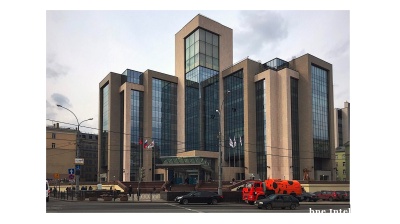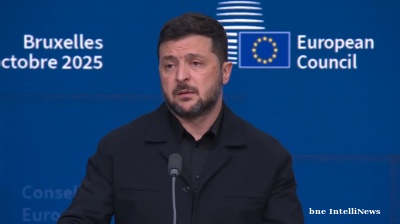Hungarian Prime Minister Viktor Orban accused EU leaders of self-destructive policies by unconditionally following US foreign policy interests, while touting his controversial, self-described "peace mission" as a success in his annual address at the summer university in Băile Tușnad, Romania, on July 27.
Hungary’s strongman envisioned the emergence of Asia as the new global economic power and, to the surprise of many, he had some tough words to say about the new Polish government, accusing Warsaw of pursuing the "most deceitful politics."
The annual summer university in Transylvania has become a meeting point between the Fidesz political and cultural elite and ethnic Hungarians living outside the country. The five-day festival ends with the keynote address by the prime minister, where he lays out his vision for the future, including on big geopolitical issues.
These are often ridden with controversy. A year ago, Orban sparked a diplomatic storm for making fun of Romania’s government and political system, and the leftist-liberal government of Slovakia after he referred to the area of southern Slovakia with a sizeable ethnic Hungarian minority as "breakaway territories."
At the same gathering in 2022, he caused an international uproar when he said that Hungarians "don't want to be a mixed race" like in some Western European countries. Ten years ago, after his second supermajority victory under tweaked election rules, Hungary’s strongman first used the term "illiberal democracy", which is in retrospect seen as the first explicit acknowledgement of his shift to autocracy and the slow demise of Hungary’s democracy.
Before travelling to the picturesque Băile Tușnad summer camp, Orban was hosted in Bucharest by Romanian Prime Minister Marcel Ciolacu to discuss bilateral relations, according to the PM’s press chief. As the current holder of the EU rotating presidency, Hungary will put Romania's full Schengen accession on the agenda in the autumn. The two leaders also discussed the Bucharest-Budapest high-speed rail link, the statement added.
In his speech, Orban touted his globe-trotting in Kyiv, Moscow, Beijing, and Washington as a success, saying that since his trip ended, there have been signs of diplomatic activity picking up, referring to the telephone conversation between Ukrainian President Volodymyr Zelenskiy and US Republican presidential candidate Donald Trump, and that between US Secretary of State Antony Blinken and Russia's Foreign Minister Sergei Lavrov.
In his view, neither side is willing to give up the war, which is leading to an escalation of the conflict, so peace can only come from the outside.
"Albeit slowly, we're moving away from a European pro-war policy in the direction of a pro-peace policy," he noted.
Orban’s self-proclaimed 'peace mission' after the start of the country’s six-month presidency at the Council angered allies and raised calls by some member states to end or shorten Hungary’s rotating EU presidency. The Hungarian PM, seen as the strongest ally of Vladimir Putin in the EU, has opposed the delivery of weapons to Kyiv and continues to try to block financial aid to the country.
Orban described Russia's position in world affairs as rational and predictable, unlike the "weakness" of the West. He noted that Russia has demonstrated economic flexibility in adapting to Western sanctions, while Ukraine’s strong resilience in his view was attributed to Ukraine getting "a flash of the perspective of belonging to the West" instead of being a buffer state.
Orban said European politics "has collapsed", arguing that Europe had relinquished the protection of its interests in order to follow unconditionally the politics of the US Democratic Party, adding that sanctions imposed on Russia were hurting European interests, raising energy prices and making the European economy uncompetitive. The Hungarian government has blamed its economic mismanagement, soaring inflation, and runaway budget deficits during 2023 on Western sanctions, claiming that sanctions are hurting the EU more than Russia.
He went on to say that if Europe did not shift to a "peace policy" by the time of the November election, it would have to do so after Trump's victory, "admitting defeat" and bearing the political consequences alone.
Orban is the sole EU leader to come out in support of the former president, and he is hoping that Trump's election victory would elevate his prestige in Europe.
Orban drew criticism from US Ambassador David Pressman for "peddling Kremlin conspiracy theories about the United States"
"Hardly what we expect from an ally," Pressman tweeted on X.
He also criticized Poland for wanting to become the "primary European stronghold of the US" and for pursuing the "most deceitful politics" in Europe, arguing that while Warsaw is "obliviously doing business with the Russians, they "morally lecture us for doing the same thing." He said Poland had abandoned the Visegrad cooperation through this strategy by forming a new power centre with London, the Baltic States, and the Scandinavian states.
He said the idea of replacing the Paris-Berlin axis was not a new one, but rather "an old Polish plan" that involved Poland becoming the continent's main American base.
Poland's Deputy Minister of Foreign Affairs Władysław Teofil Bartoszewski said on Sunday that Orban's policy is currently anti-EU, anti-Ukrainian, and anti-Polish, adding that the Hungarian premier is currently blocking a PLN2bn (€467 million) EU refund for Poland for military equipment transferred to Ukraine.
In his address, Orban also claimed that the US was behind the 2022 Nord Stream pipeline explosion, referring to it as a terrorist act, though he did not provide evidence for this accusation.
In the 90-minute speech, the Hungarian leader also talked about the change of a new world order, which would be led by Asia. There is already a Hungarian "grand strategy" in the making to prepare for fundamental changes beyond 2030. Hungary’s interest lies in connectivity, as the country "must not find itself locked into either of the emerging Western or Eastern economies".
The Hungarian prime minister was criticized by opposition parties for drawing up bold visions and geopolitical strategies instead of addressing issues at home, such as the cost of living crisis, the slow recovery of the economy, or rising indebtedness.
Instead Orban vowed to extend family support schemes outside the border to ethnic Hungarians and to double tax discounts for families in 2025 to "regain demographic momentum."
At one point in the speech, the prime minister divided the young generation into two groups. On one side there are liberals, who dress in slim-fitting clothes and consume latte and avocados, and on the other side, there are young and courageous and cool patriots. Orban referred to the 20-30 generation as his successor in carrying out the transition to a new world order.
On Sunday, Fidesz spokesperson Tamas Menczer followed up on that, saying the left wing has lost its allure and the "greatest rebellion today is to be patriot".
The rise of the Tisza Party highlights a significant shift among the younger generation, who have largely abandoned the ruling party. Fidesz now holds a majority only among voters over 50. In the June European Parliament election, Fidesz received 2 million votes, with only 7% from individuals under 29, 12% from the 30-39 age group, and 18% from those aged 40-49. Notably, one-third of Fidesz supporters were over 65 years old.
In contrast, a fifth of Tisza voters (22%) were between 18-29 and the core of the new centre-right formation – 50% – came from the 30-49 age group. Only 11% of the 1.3mn votes received by the party led by former Fidesz cadre Peter Magyar were older than 65.
News

Russia's Lukoil to sell international assets as a result of new US oil sanctions
Russia's second-largest oil producer, the privately owned Lukoil, will sell its international assets as a result of the new oil sanctions imposed by US President Donald Trump last week.
Category 5 hurricane Melissa bears down on Jamaica with Haiti and Cuba in storm's path
A catastrophic Category 5 hurricane was bearing down on Jamaica on Monday, October 27 afternoon with sustained winds of up to 282kph (175mph), threatening to become the strongest storm the Caribbean island has ever experienced.
.jpg)
US senator tells Maduro "head to Russia or China" as warships close in on Venezuela
A senior US Republican senator has warned that Venezuelan President Nicolás Maduro's time in power is running out and suggested he leave the country, as military tensions in the Caribbean continue to escalate.

Milei celebrates resounding victory in Argentina's midterm elections
Argentine President Javier Milei scored a major win for his La Libertad Avanza (LLA) party in Argentina's October 26 midterm legislative elections, as the party obtained approximately 40.84% of the nationwide vote with 99.14% of the votes counted.




